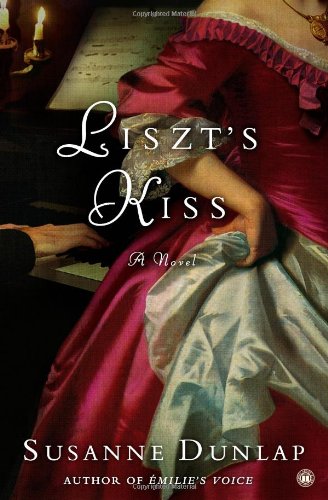Liszt’s Kiss
Paris, 1832. A cholera epidemic rages, and Anne de Barbier-Chouant has lost her beloved mother to its deadly grasp. Alone in the crumbling family mansion but for servants and a remote, menacing father, Anne seeks solace in the keys of her mother’s Erard piano — until the marquis angrily locks it away. The marquis may have dark plans for Anne, but Marie d’Agoult, patroness of the arts and friend of Anne’s mother, adopts Anne’s cause and arranges lessons for her with the celebrated Hungarian pianist, Franz Liszt. Both Anne and Marie fall under Liszt’s sensuous spell, and Anne faces intrigue and danger as she stumbles upon long-hidden secrets which could be as deadly as they are devastating.
Dunlap has done it again. Her 2005 debut, Emilie’s Voice, was a skillfully rendered tale of intrigue, love, and music, and in Liszt’s Kiss, she has applied this formula with equal success. This novel has a more gothic feel, which adds to the delicious tension and foreboding which Dunlap expertly conjures. She masters the zeitgeist of 1830s Paris under the pall of an epidemic, from the camphor sachets to the misery of the Hôtel Dieu hospital. Dunlap’s characterization is well-realized, and her examination of her characters’ feelings and motivations is spot-on. This is especially true of Liszt, who is not the villain of the tale — just supremely egocentric and intense, like many great musicians, but rendered completely compelling by his art. Dunlap’s prose is expressive, but it becomes vividly evocative whenever she describes music and the effect it has on those who populate her story. Like Anne, the reader is easily immersed in “that other realm, where nothing mattered except music, and the closeness of two human beings.” Add this one to your “to read” pile; Liszt’s Kiss, an engrossing mixture of history, suspense, and music, is highly recommended.










